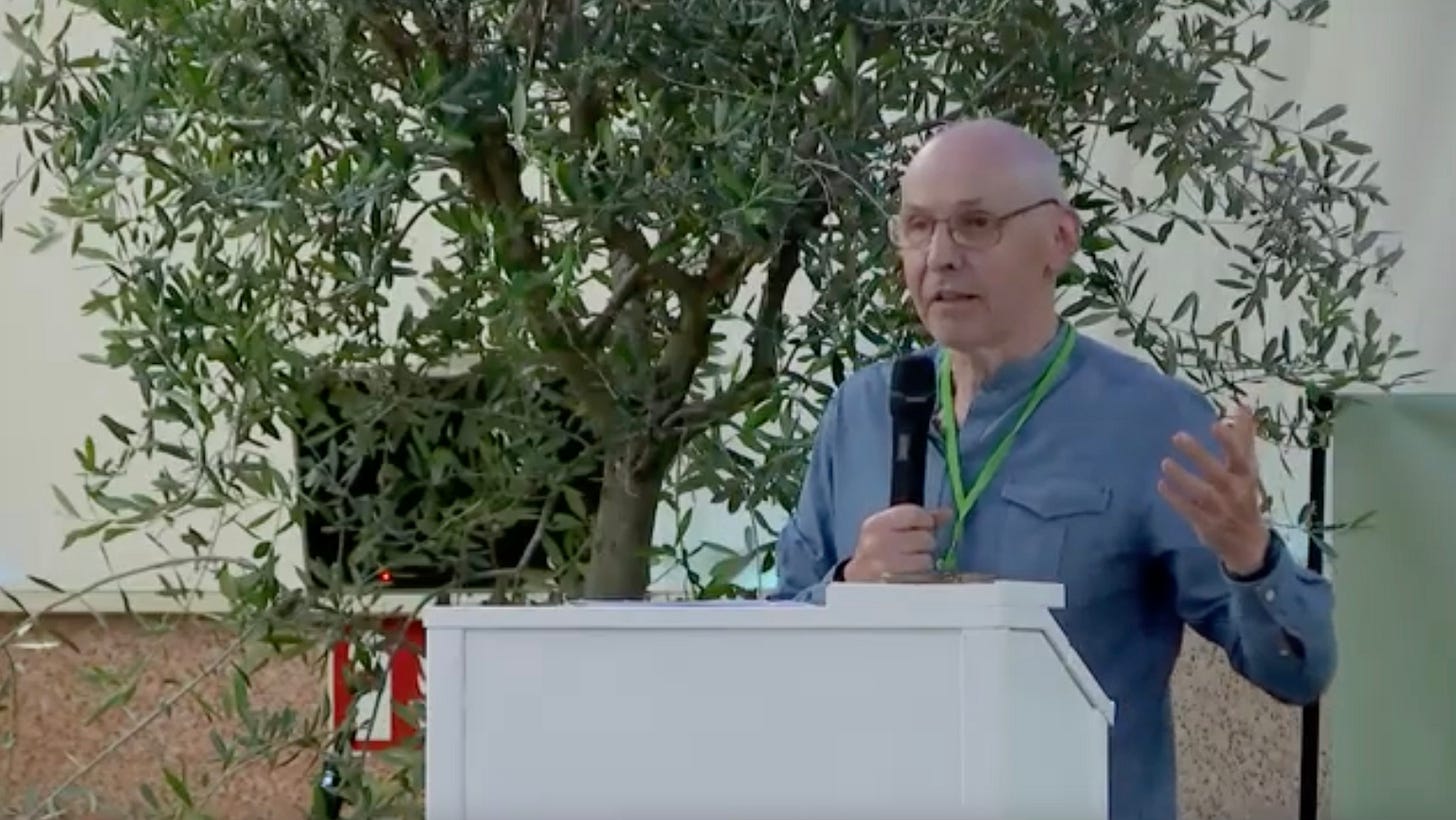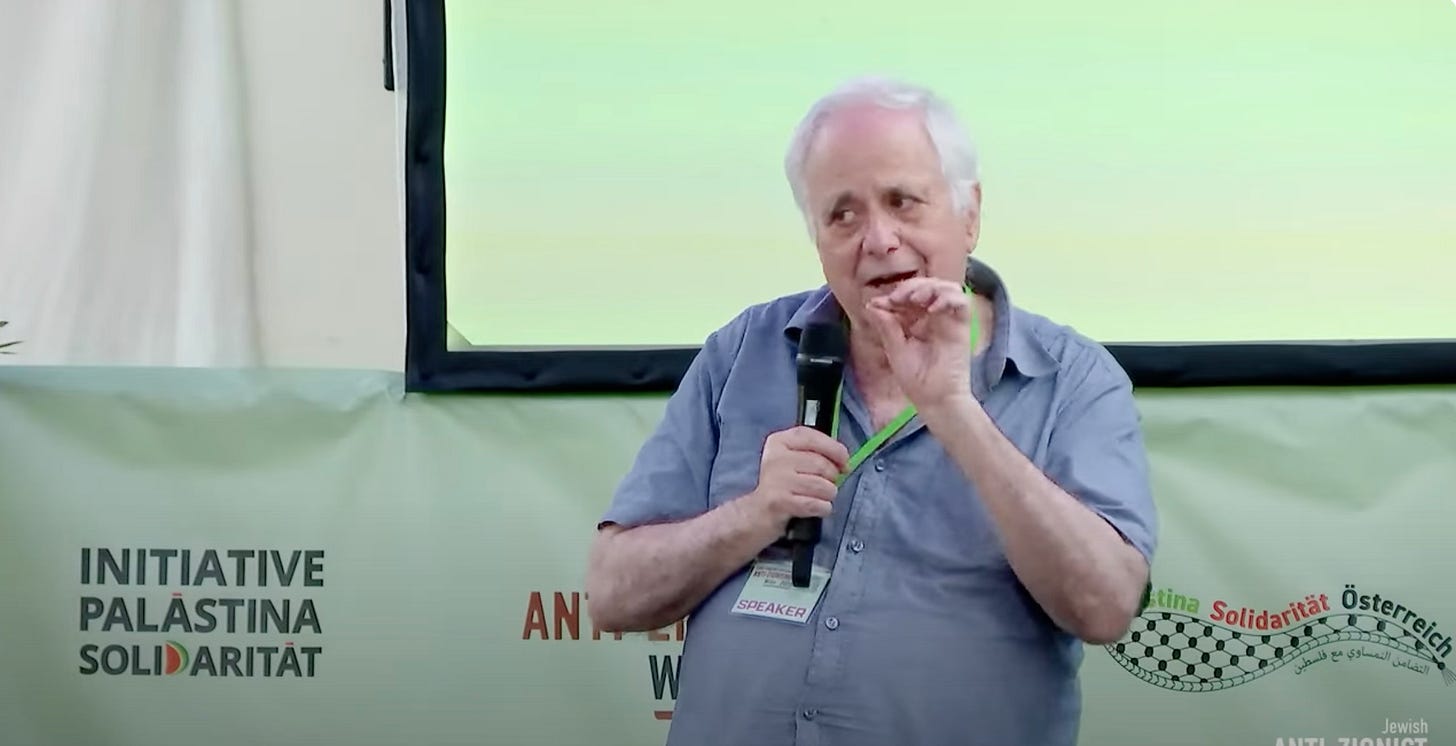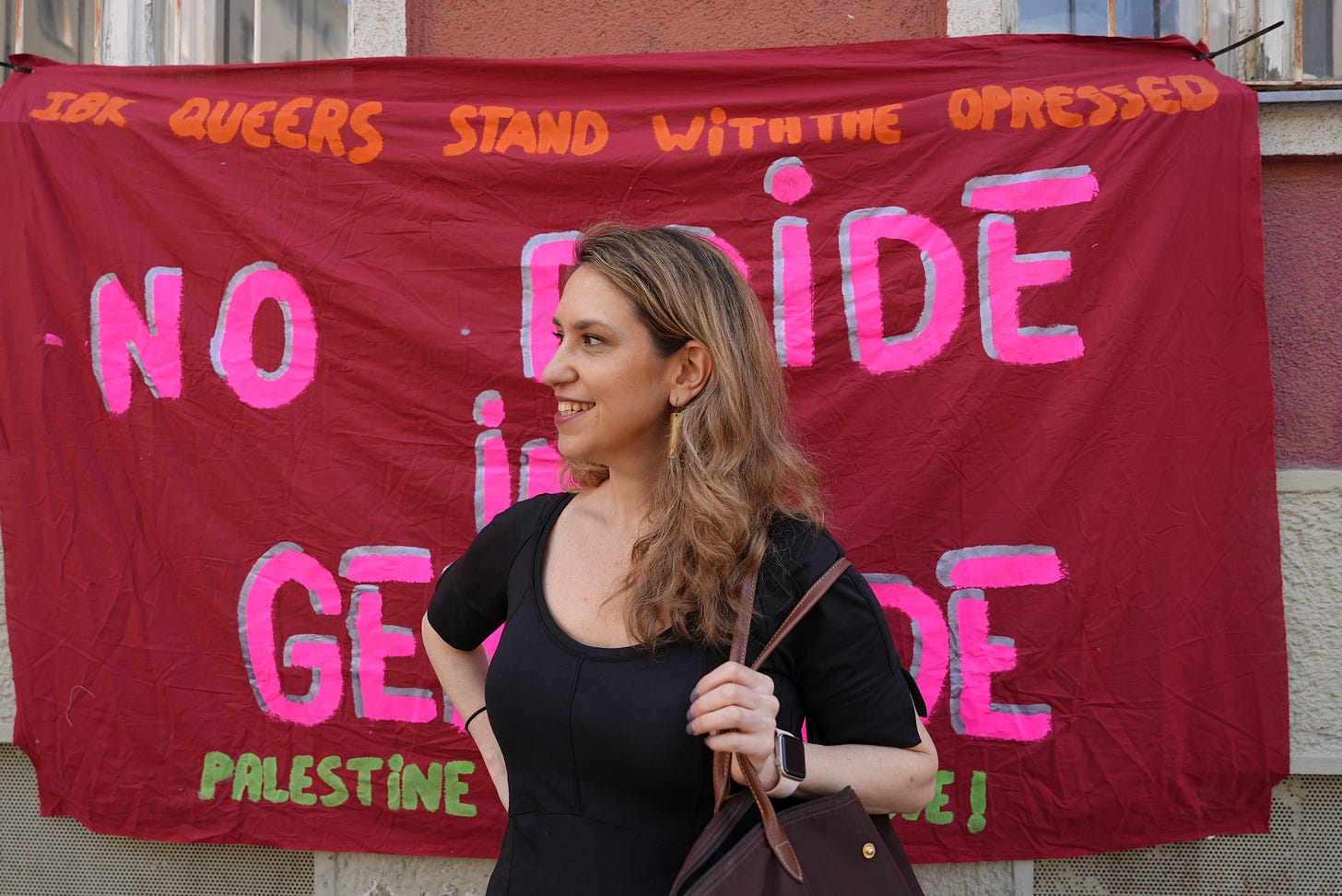The beginning of the end of Zionism : the first Jewish anti-Zionist conference
Vienna June 2025
Activist at First Jewish anti-Zionist Conference, Vienna, June 2025
A three-day conference was held in Vienna in mid-June 2025 which brought together a variety of academics, journalists, activists and citizens- coming from all continents- who felt an urgent statement needed to be made on the meaning of Zionism and its future.
In order to understand Zionism, the movement was placed in its historical context as testimonies were heard on its rise, its contested history, as well as its unheard histories, deliberately omitted narratives.
We heard harrowing omitted stories on the Arab Jewish identity, whose layers upon layers of historical narratives and their identities have been suppressed. Reuven Abergel, Moroccan Israeli social and political activist and a co-founder and former leader of the Israeli Black Panthers recalled his first encounter with Zionism when he left Morocco as brutal, aggressive, suffocating. Yet it was too late at the time to go back to Morocco. Reuven Abergel recalled how the Jews in Marocco did not suffer discrimination or persecution as in Europe.
Reuven Abergel at First Jewish anti-Zionist Conference, Vienna, June 2025
He remembered his first meeting with then Prime Minister Golda Meir who asked him: “why did you chose the name Black Panther since they are antisemites and anti-Zionists.” He answered: “ I do not know the Black Panthers, yet it’s not them who hindered my education, it’s not them who ruined my health, nor did they stuff me and my nine siblings in a small room, you are the antisemites, as you are the ones who did this.”
Zionists, at the inception of the state of Israel, divided the Arab Jews, known as Mizrahi, by isolating its leadership and sending many to contested areas where the Palestinians had been ethnically cleansed or pushed off their land; 50,000 Arab Jewish children were kidnapped and given to newly settled European Jews and other families, a tragedy which to this day has remained unaddressed and whose official acknowledgement the Israeli Black Panthers are asking. Archives on this and other still taboo narratives on the beginning of the Zionist state are suppressed in present day Israel. “Benjamin Netanyahu has buried these archives for at least another 70 years,” Abergel stated. Only much later, via his political activism, was he able to achieve some compensation for Arab Jewish and Palestinian children who had undergone experimental medical radiation for treating ringworm, radiation which caused numerous deaths and life injuries. This is another taboo topic in Israeli history.
For 40 years Reuven Abergel’s passport was taken away from him, as well as his Israeli citizenship, just for his political activism. Arab Jews in Israel were and are second class citizens.
Artist, curator, author and co-founder of the Tunisian collective Nessij, Camille Lévy Sarfati told us of the complexities of Arab Jewish identities which she is exploring first-hand as she moved back to Tunisia from France to reclaim her family’s history. This return was both an emotional and a political move. Lévy Sarfati’s research centers on the artistic practices of resistance and survival of the Afro-Asian continents and their diasporas. She cited professor of cultural studies at New York University Ella Shohat’s work as she recalls Israel’s failure, by focusing solely on European Jews, to account for the multiplicity of Jewish histories. Cleaving Arab-Jews from the Arab world was undertaken by Israel to justify the Zionist discourse.
Camille Lévy Sarfati at First Jewish anti-Zionist Conference, Vienna, June 2025
Lèvy Sarfati underlined that a continuous Nakba is also the result of a collective failure to produce strong narratives. Her 2018 return to Tunisia has allowed her to not only reconstruct her personal family history but also to overcome the colonial dislocation and departmentalization, thus embracing the millennial Jewish Arab world she belongs to.
Calling for a return of all Palestinians, refugees since 1948, to their homeland is thus also urgently necessary not only as a right of return but also to regain power over long defunct narratives.
Reclaiming multiple affiliations was also the focus of Jewish historian Donny Gluckstein’s talk as he focused on the strong streak of universalist and radical political principals as a core to Jewish identity. Gluckstein explains how Zionism is a complete break from Jewish history prior to 1896, when the idea of a Jewish state was first born. Zionism has even enshrined in Israel’s constitution a fabricated history. Before 1949 one Jew out of 27 chose Palestine as a place to emigrate.
Donny Gluckstein at first Jewish anti-Zionist Conference, Vienna, June 2025
When emancipation as well as language and religious segregationist policies against the Jews ended in 18th century Europe, Jewish identity took on an internationalist and anti-capitalist element. With the rise of industrial capitalism in the western Russian empire Jews created the Jewish labor Bund, a socialist political movement, founded in Vilnius in 1897, which was anti-nationalist, left-wing and consciously rooted in its place: Gluckstein explains that there was even a word for it’s place-based struggle, namely hereness. Jews fought together with non-Jewish workers against Tsarism, exploitation, oppression. Yet the Tsar, signaling them as scapegoats for all the ills of capitalist society, began pogroms, massacres targeting Jews.
Jews fought at the time in alliance with their fellow non-Jewish companions. For example, three emblematic radical Jews such as Karl Marx, Rosa Luxembourg and Leon Trotsky united and fought alongside non-Jewish figures such as Friedrich Engels, Karl Liebknecht and Vladimir Lenin respectively. Radicalism as a core Jewish identity can be traced throughout history: some examples are the Bund that had helped the 1917 Russian revolution organize; the Russian revolution; Jews were fifty percent of the US communist party; Jews played a huge role in the anti-apartheid struggle in South Africa.
It is this Jewish radical tradition of anti-imperialism and anti-capitalism that is today again coming to the forefront as it demands the liberation of Palestine, Gluckstein concludes.
Ilan Pappe at first Jewish anti-Zionist Conference, Vienna, June 2025
We heard from Israeli New Historian Ilan Pappe which underscored that although today the first priority is stopping the current Palestinian genocide, a long-term solution should already be envisioned : namely a one state solution for the region. Pappe underlined that the Palestinians must be the ones to lead this conversation and thus to decide to what extent to invite Jewish partners, what the destiny of the 8 million current Jewish Israelis should be in a future state etc. Citing Ussama Makdisi Age of Coexistance, which describes the forging of a complex multilayered system of coexistence between Jews Muslims and Christians prior to 1948, Pappe gives this as one example from which to draw inspiration for a future institutional set-up for the region. For Pappe inspiration should come from the mosaic of eastern Mediterranean populations that perceived themselves as ethno-cultural groups, prior to the creation of the state of Israel. The decolonization process must begin starting from 1948, by imaging and ultimately forging a post-colonial and post-Israel Palestine.
It is all the more necessary as, when Israel will collapse, the void left must be filled. Doctor and researcher Ghada Karmi, who has written about a one state solution since even before the 1990s, also underlined that the way forward from the current situation is moving beyond the two-state paradigm, a set-up which only legitimizes the settler colonial project.
Ramzy Baroud at first Jewish anti-Zionist Conference, Vienna, June 2025
Ramzy Baroud, acclaimed public speaker, author and founder of the Palestinian Chronicle did not focus on the unfathomable suffering he has undergone: he is from Gaza and has lost over 100 members of his family in the recent and still on-going genocide. He instead pointed to Zionism as incapable and unwilling of finding a solution for peace in the region. The Gaza genocide epitomizes the culmination of a centuries long racist dehumanizing discourse which needs to be dismantled; Gaza has become a focal point exposing the numerous players who are culprits in this tragedy. The current tragedy also brought to light an incredible and strong resistance on the part of the Palestinian population that does not have a national army to defend itself, yet is driven by hope and defiance even when faced with the worst unimaginable repression: Palestinians encapsulate hundreds of thousands of Antigone-like bravery as they refuse to omit a dignified burial for their lost ones, as they refuse to leave from a land that is theirs and that they belong to.
Moving beyond intellectualism is essential for Baroud in these days as Gaza is suffering. Like all resistance movements they should be sustained for their rightful quest for liberation. The solution for Baroud already exists as international law has already defined the Israeli state as an illegal occupation.
Journalist, activist, filmmaker and podcaster Katie Halper, coming from New York, gave a moving talk on the repression of those who today provide information on the genocide in Gaza, worldwide, but especially in Gaza, where journalists and those who speak out are systematically targeted by the Israeli army. She recalled amongst others the assassination of Palestinian writer, poet, professor, and activist Refaat Alareer as well as the death of Aljazeera journalist Samer Abudaqa who was left to bleed to death for five hours after being shot.
Katie Halper at first Jewish anti-Zionist Conference, Vienna, June 2025
Halper was fired from an American news show called Rising after they refused to air one of her monologues on the genocide. If the intent of this censorship was to silence her it did not work, rather she now has amplified her work on the topic. Some of the most influential voices of the resistance to the current genocide can be heard on her two podcasts the Katie Halper Show as well as Useful Idiots.
Halper is currently working on a documentary film on Holocaust survivors and their descendants who are today fighting against the genocide in Gaza. Two such Holocaust survivors and anti-Palestinian genocide activists, Haim Bresheeth and Stephen Kapos, also spoke at the conference. In November 2024 Britain arrested 79-year-old Professor Bresheeth just for demonstrating against the genocide. The images of his arrest went viral on social media. We watched a small clip of Halper’s engaging forthcoming documentary of another Holocaust survivor today defiant against the Palestinian genocide.
Halper underscored that a new acronym for children has been established since the Gaza genocide: WCNSF, wounded children with no surviving family. Without forgetting this horrifying reality in Gaza, Halper believes that the fight to stop this genocide has already been won, as the majority of Americans today call for an end to the Israeli violence. She also made a connection with the recent Los Angeles migrant uprising, revealing the ludicrous and morally displaced attempts by US main stream media to smear these activists as opportunists: these migrants also spoke up against the genocide in Palestine, all while struggling for their rights to be upheld.
These are only some of the many other brilliant interventions heard in the three-day conference which can be watched here.
Many participants told me they hope there will not be the need for many other such conferences, as Zionism, just as apartheid, will soon be superseded.
Indian economist and philosopher Amartya Sen in Identity and Violence writes about the fabricated civilizational partitioning that classifies and understands human beings merely on the basis of a narrow one group membership, such as a religion or a culture. The illusion of singular identity confines people within narrow and rigid boxes. This is how violence is fabricated and comes about. This conference and its brilliant speakers has shown a Jewish identity that goes far beyond the singular and one-dimensional sense of a Zionist identity, embracing multiple narratives, histories and affiliations. The radical Jewish tradition and its alliance with non-Jewish partners in struggle was ever more present.
Overcoming and discarding Zionism will liberate the Palestinians in their own land and also allow Jews to reclaim their multifaceted and rich universal history.
First Jewish Anti-Zionist Conference, Vienna, June 2025











